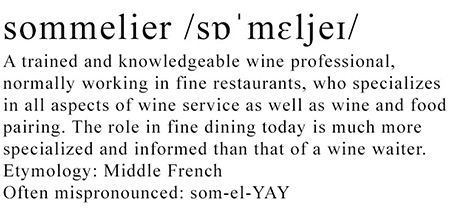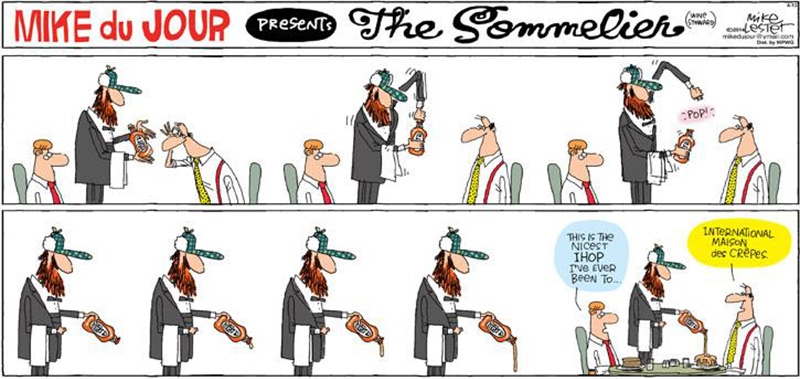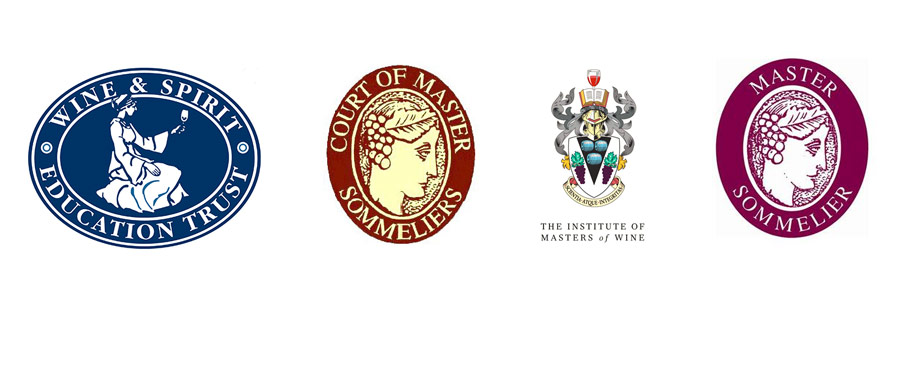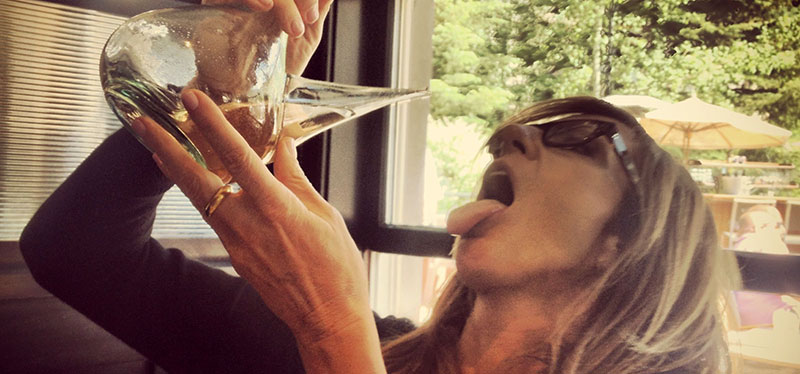Long gone are the days of a bellied, middle-aged white man proclaiming himself a wine expert because well, he likes wine and wants to tell you about what he likes. No, we’ve reached an age where having some kind of certification in wine is a prerequisite for talking about it professionally.
Wine is a complicated beast of a subject and people are always wanting to try and make it “more approachable” or “democratize it” as if wine were some kind of plebiscite accessible only to landed gentry. Despite all the best (and worst) efforts towards this, you can never, ever know all that there is to know about wine, which is why having some solid theoretical foundation by way of an official certification is so incredibly crucial. Not only does it give you a grounding in order to (hopefully) keep learning more, but it tells others you’ve studied the subject in a serious manner and might indeed know something beyond the fact you like drinking wine.
Now there are actual, real titles one can earn in the wine world. And then there are those which are akin to someone waking up one morning, deciding that they’re an actor and moving to Los Angeles. So it’s worth taking a look at the common titles in use to have some frame of reference for when someone says they’re Bob Shmob Wine Expert or Julie Juliette MW MS MBA OBE. Note that I won’t delve into Master of Wine or Master Sommelier here as those have been covered at length previously. Also, the Wine Influencer has seen itself scooped deeply as well already and does not require re-treading those specific grounds either.
Sommelier
 Let’s slam headfirst into the worst one. As can be seen in the image, a sommelier is a profession which, at its core is held by someone who studied wine and is also knowledgeable about service and hospitality. They’re also working the floor doing drink service whether that be at a bar or a restaurant. It’s a title that’s massively overused and abused (water “sommelier”?) but essentially, if someone tells you that they’re a “sommelier”, then you should be able to ask where they work and if they say the name of a law firm, they are not a sommelier and it does a disservice to anyone who actually is working the floor given that it’s very tough, physical work that many can only do for a short time. Likewise, someone calling themselves a “former sommelier” is a serious fudge and should be disregarded, although more on that in a moment.
Let’s slam headfirst into the worst one. As can be seen in the image, a sommelier is a profession which, at its core is held by someone who studied wine and is also knowledgeable about service and hospitality. They’re also working the floor doing drink service whether that be at a bar or a restaurant. It’s a title that’s massively overused and abused (water “sommelier”?) but essentially, if someone tells you that they’re a “sommelier”, then you should be able to ask where they work and if they say the name of a law firm, they are not a sommelier and it does a disservice to anyone who actually is working the floor given that it’s very tough, physical work that many can only do for a short time. Likewise, someone calling themselves a “former sommelier” is a serious fudge and should be disregarded, although more on that in a moment.
Certified Sommelier
This is an actual title that one earns from the Court of Master Sommeliers (CMS) and is universally seen to have a solid reputation on an international level. That “former sommelier” title some people use? Well, that means they haven’t done the Certified exam as anyone who has, will definitely mention it.
Partly due to the eternal, never-ending (yet really should end) SOMM series, it’s become very popular in the US to be a “Somm”. The reality is that it should just be for people who are actually in the wine trade. Everyone else who simply wants to know more about wine, should do the WSET, but that’s not sexy enough; more below.
Oddly enough, you can be titled as a “Certified Sommelier” yet not actually be a “Sommelier” given that the first is a title and the second a profession. You don’t usually hear someone who is now working in as a paralegal introduce themselves a “car mechanic” even though they may have been one for 10 years previously. I hold the Certified Sommelier title but as I don’t work as one, I always emphasize that it’s just a title and I should not be called a “sommelier”. These may seem like silly semantics but they hold a good deal of weight to them in terms of professionalism in wine.
Note that there is a level before the Certified called the Introductory Sommelier and while also from the CMS, it’s absolutely not at the same level of knowledge as the Certified. I’ve seen people write Certified Introductory Sommelier, or Court of Master Sommeliers Certified or something to that effect but this is definitely not correct.
WSET Certified
I don’t really know what this means to be honest. The WSET has four levels, each getting exceedingly more difficult as you work your way up. Anyone who has spent some time in the wine trade can usually start at Level 2 or even Level 3 and once having completed Level 3, they usually state WSET Advanced Level 3 in their bios/CVs. So, I have to assume that when someone states “Certified”, they are either Level 1 or Level 2 but the truth is, this doesn’t exist and for good reason as it’s exceedingly nebulous.
I suppose they feel they can flub it as Level 2 with the CMS is “Certified” but there unfortunately isn’t a correlation between the two branches of classroom study in the WSET vs. service study of the CMS as shown by the fact the CMS Level 3 Advanced is insanely difficult, way beyond the knowledge level of the WSET Level 3 Advanced. We’re stuck with this as it is given how many people have passed the exams in these levels and re-jiggering them to be something more sensible ain’t gonna happen.
One last note, there is absolutely no such thing as a “WSET Sommelier”, at any level. WSET is a classroom-oriented study path, whereas the CMS is all about self-study and service, thus the latter is the whole sommelier tamale.
DipWSET
It must be said that this is not a pleasant acronym. It sounds like a combination booster shot for when traveling to tropical countries. But, it’s how the WSET has decided to abbreviate holding the WSET Diploma although the end result is a lot like the wincing pain one feels when a politician attempts to be “cool” and/or “dope”.
It’s a pity as this is one of the highest qualifications in wine studies bar earning the Master of Wine/Master Sommelier which are the absolute pinnacle. If someone puts this after their name, it does indeed mean that they know a great deal about wine, but also that they shouldn’t be an asshole about it because while it may seem like they’ve reached the top, much like Mount Everest, it’s a very crowded peak with some 10,000 other people there, jostling for a position. Also, there’s the higher peak of the MW/MS whether they choose to see it or not.
“_________” Wine Scholar
This was originally the French Wine Scholar program which, once they expanded to Italy and now Spain, has been re-branded as the Wine Scholar Guild. While regular wine drinkers can attend these courses, the assumption by the company is that people attending are in the wine trade and wanting to go even deeper on specific regions/countries.
The French program is not cheap but has been held in high regard by all the people I know who have taken it as well as those who’ve worked to teach the courses and write up the materials. As you can see on their website, they’ve picked up a lot of well-known and expert people in the field to teach and advise. The exam is not easy and it goes into a far deeper level on France than the WSET Diploma from what people have told me. Additionally, there are regional French “scholar” certifications as well.
I can’t speak as to the Italy certification as I don’t know anyone who has gone through it nor have I reviewed the materials. The Spanish one however has just started and while there are a couple of testimonials on the page, the material was drafted up by someone with no discernible background in Spanish wine and whose qualifications for writing the materials are, that he wrote the materials… Time will tell as to whether this certification has the legs of the French one or not.
Wine Judge
While not as loaded as the “sommelier” title, it is a nebulous title that is also very overused. I would never put this after my name despite judging multiple competitions per year. For starters, it’s not a profession as judging doesn’t pay anything more than your travel expenses–and not even that sometimes. Also, except for the very competitive certification system in Australia, there is no international certification to be a Wine Judge. So essentially, anyone with tenuous connections to the wine trade can pop into any number of the many small competitions that exist out there and judge. They’ll be a shitty one, but that hasn’t stopped many a would-be “wine judge” in the past. The more serious competitions require certifications like CMS or WSET as they rightly should but all are not equal.
CSW/CWE
These are Certified Specialist of Wine and Certified Wine Educator respectively. The second is a notch above the second in terms of knowledge but they’re both something of a correspondence education, especially the CSW where you read a book and then take a multiple choice test. They do indeed show some degree of wine knowledge but they’re not as popular as the WSET/CMS. All of this is overseen by the Society of Wine Educators in the US and I’ve seen that many people will earn this in addition to say the Certified Sommelier or some level of the WSET because, why not?
Wine Educator
This has popped up in recent years as many surveys about the wine profession show that “education” (ie, teaching people about wine) is the most lucrative aspect of it. Yes, there’s the aforementioned “Certified Wine Educator” certification but then there are also the people who go around simply calling themselves “Educators” and offering “classes” to which there’s not really anything to stop them from doing so. Note that some wine bodies offer up certification programs but these are regionally specific and only overseen by the respective entities.
In theory, someone who educates others should hold a high level of knowledge and thus have at least WSET Diploma or something thereabouts. But then there’s the issue that education actually is a skill and one that people who teach in schools go and train for. No one I’ve heard of in wine is doing as such. They largely stand up and talk about something they’ve read or tasted and that’s it. Some do this well and others not as much. The fact that there’s no established path other than the WSET five day course for teaching WSET classes is problematic as there are definitely some shitty “educators” out there, who even present their own, non-binding certificates of course completion.
As something of a related title, there’s the “Wine Communicator”. The only real difference between the two seems to be that the Communicator doesn’t have a classroom angle to what they do but then again, they’re both names for essentially the same thing.
It’s a new land rush in this field so we’ll see how it all shakes down but generally, ask many pointy questions of anyone who is an “Educator” because if they’re training people, they should be rock solid in all things wines.
Brand Ambassador
There is really only one type of “ambassador” in the world and those are the people appointed to represent a country via its embassy in a foreign country. All others, are sales people. Oddly enough, they’re sales people who aren’t really required to sell anything. They just need to show themselves enjoying the product–in this case wine–and create a “lifestyle” image around it. Whether that means they’re a hot female/male model or some frumpy “wine expert” who declares undying love and admiration for the wine, make no mistake that no matter how genuine they may seem, they’re on the payroll whether it be for a single winery, a wine region, or even an entire country. Everything they say should be held up to be as suspect as a dog standing next to open kitty treats.
Enologist
Spelled various ways including “oenologist” or “enolog”, this is much less used in English than it should be, as is an actual winemaker (see below) who has attended and passed qualified courses, usually at a university. It’s rigorous study and is either a three or four year program depending upon the country and there are post-graduate Master programs as well. The enologist courses see a heavy focus on biology, chemistry, and viticulture so that anyone who has finished one of these program is truly able to understand wine, at least at a scientific level.
Note that this is a relatively new title and some people may hold an older, yet still valid title such as “agricultural engineer” which contains much of the same course material. And there are of course people who feign that they’re an enologist and should always be challenged as to where they received their degree because faking this is a slap in the face to everyone who made it through one of these programs.
Note: An Enologist and a Sommelier are not the same thing. For some reason people will use these interchangeably when they couldn’t be more opposite from one another!
Winemaker/Vintner
Something like “sommelier” but for wine production in terms of how undefined this is, at least in English. In other languages, someone is either the “owner” or the “enologist” or sometimes both if they’ve done the study and then started the winery. As well-heeled Californians started popping up to Napa Valley and other regions to start wineries, they adopted “winemaker” after their names. The reality is that most of these people are just the money behind the operation and haven’t set foot in a vineyard or the cellar save for a taking a photo to put in marketing materials. This is especially out of control when discussing celebrity “winemakers”.
In reality, anyone using this title and wanting it to mean something should be making all the decisions regarding every step of the grape growing and winemaking process, as well as determining the final tasting profile of the cellar. Short of that, nice photo of you in ironed blue jeans, Mr. Gentleman Winemaker.
Wine Journalist/Wine Writer
To close out the constant theme of this list, there is, no surprise, not an actual certification to write about wine. Those who do it well have most likely studied wine and/or writing. Note that the second part is actually more important than the first as good information written poorly is one of the worst crimes there is, second only to bad information written badly which is now available in a hardbound edition.
There is something of a premise that if you call yourself a writer, you are getting paid to write about wine but times have changed and people who only have blogs, or even just a Vivino account, will list “wine writer” as an occupation in their bios.
With the exception of the “Wine Judge” (which is done for bragging rights or networking usually) all the other titles are money making but being a writer, usually not, especially at the entry levels. So, why on the earth would someone pursue this line of “work” if it doesn’t pay? The simple reason, which has been talked about at length in conferences and on social media, are the freebies, whether it’s just free wine or better, free trips. This has become outdated in this age of “Influencers” (see above) but there are still those who work to portray themselves as wine writers purely to get their turn at the tap.
The only advantage of someone calling themselves a journalist or writer is that they theoretically need to have some kind of writings to show for it and so one can go, read them, and decide just how much right they have to call themselves as such, hopefully.
You’re reading a free article on Hudin.com.
Please consider subscribing to support independent journalism and get access to regional wine reports as well as insider information on the wine world.



If you don’t get paid for what you do, then you are not — by definition — a working “professional.”
You are an “amateur” (from Latin amatorem).
The wine world is replete with talented amateurs. Some of whom take up “the calling” and transition from hobbyist to professional status.
(Best example: Robert Parker.)
Excerpt from Los Angeles Times “Front Page” Section
(August 23, 1987, Page A1ff):
“Wine Writers: Squeezing the Grape for News”
[Series: First of Two Articles]
URL: http://articles.latimes.com/print/1987-08-23/news/mn-3198_1_wine-writers
By David Shaw
Times Staff Writer
Two years ago [circa 1985], Craig Goldwyn — publisher of International Wine Review magazine — spoke to a couple of East Coast audiences about people who write on wine for American newspapers and magazines.
Goldwyn, who also writes a monthly wine column in the Washington Post, began by asking, “What is a wine writer?” Then he answered his own question:
“A wine writer is a physician or a lawyer with a bottle of wine and a typewriter, looking to see his or her name in print, looking for an invitation to a free lunch and a way to write off the wine cellar.”
Colman Andrews, who writes about wine for Los Angeles magazine, offered an even more acerbic observation in a recent interview:
“Any jerk can call himself a wine critic and get published.”
Andrews and Goldwyn may have been indulging in a bit of hyperbole–but not much, judging from recent Times interviews with more than 40 wine writers and 15 editors nationwide, as well as with about 90 other people in the wine industry — wine makers, winery owners, importers, retailers, wholesalers, distributors, publicists, restaurateurs and representatives of French, Italian, German, Spanish and Australian wine, trade and tourism agencies.
Most wine writers are genuinely enthusiastic proselytizers for the wines they like — so aggressively so that some seem to “forget this is not liquid gold, this is simply . . . grape juice,” says Gracelyn Blackmer, a publicist who represents several Sonoma County wineries.
Few wine writers are either experienced, professional journalists or knowledgeable students of wine; most are wine hobbyists — lawyers, doctors or others who can afford to drink good wine regularly — or free-lance writers eager for all-expense-paid trips to the vineyards of Europe.
. . .
Good Lord, saying that the CSW is a correspondence education is so 1978. The CSW is supported by one of the best, most inclusive online platforms (including an instructor-led class that is free-of-charge to CSW candidates) in the industry. Research much?
When I looked into it, you received a text that you read and then went to a generic testing center to take a test. That’s pretty much correspondence education in my book. And I would counter that in terms of leading the field with online materials, the Wine Scholar Guild and amazingly, the WSET are the best.
I do not have any surname dingleberries like CSW or dipWSET (which sounds like what they use to rid sheep of parasites), but I worked as a sommelier for twenty years. I refer to myself now as a “recovering sommelier.” As for wine writers, I submit that you’re a writer when other people say you’re a writer, not when you do. I applied this standard to actors, too, when I worked in Los Angeles. Most were waiters. Sadly, the vast majority of wine writers these days are actually wine typists.
Welcome mightiest of Masters.
Your CSW article was actually good inspiration to include that here so I salute/blame you.
The “former sommelier” bit I knew would probably rankle some people and basically, it’s obviously a normal thing to do to have on a resume but I’ve seen it used in articles (SF Chronicle comes to mind) to justify as to why someone is the right person to educate about wine or make wine when in fact, it’s a really nebulous thing.
If someone brought wine to a table once at a Pizza Hut, they could call themselves a “former sommelier” or then there’s the service brother at Celler de Can Roca who has no certifications and yet runs one of the best wine programs in the world. If he ever decided to retire he too would be a “former sommelier”.
I think Hoser is referring to this?
URL: https://storage.googleapis.com/hippostcard/p/8ded382a81f2253165f4baf90af7ccc7-800.jpg
(Then again, I could be wrong . . .)